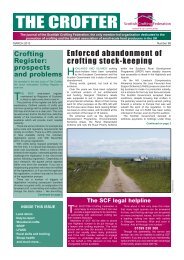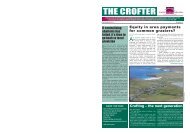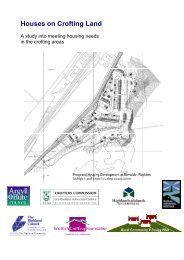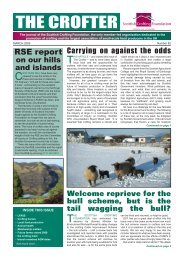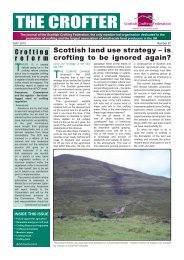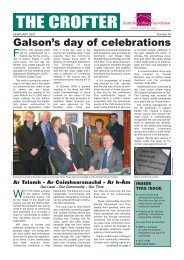Crofter 93 - Scottish Crofting Federation
Crofter 93 - Scottish Crofting Federation
Crofter 93 - Scottish Crofting Federation
- No tags were found...
Create successful ePaper yourself
Turn your PDF publications into a flip-book with our unique Google optimized e-Paper software.
16 THE CROFTER, december 2011THE CROFTER, december 2011 17SCF annual gathering 2011 SCF annual gathering 2011Anything that can go wrong will go wrongCarol Anne Stewart looksback on some of her favouriteconferencesMurphy is alive andwell and kindly helps withthe organisation of ourgathering each year.The storms that caused CalMac to cancel some of their ferriesduring this year’s gathering arejust one of the many challengesthat await anyone organisingan event. This year’s weathermeant we were short half adozen delegates. A speaker,the Lochaber delegates andour honorary Perthshire crofterhad a much longer journey thanexpected. Thankfully the keynotespeaker had decided to avoid theMallaig crossing and arrived intime to have lunch with Eleanorand some of our members.Planning the SCF annualgathering normally starts atthe winter board and councilmeeting. A list of possible areasand themes are discussed and adate pencilled in. When the areahas been decided then the fun oflooking for venues, caterers andaccommodation starts. We haveexcellent area representativeswhose help makes this allpossible.Once speakers have beenconfirmed and possible diaryclashes avoided, (sorry about thesale clash), you would imaginethat we could rest on our laurelsfor the summer.That’s when the companyplanning law comes into effectand anything that can be changedwill be changed until there is notime left to change anything. Thecunning plan that we started within January quickly becomes PlanB; and by the time of the gatheringit’s not unusual to have revisedthe programme five or six times.Changes happen for variousreasons; mainly as we try andcram even more into a fairly fullprogramme. Usually this isn’t aproblem. However one of thejoys of working with a small staffis that everyone assumes thateveryone else knows everything.I have helped organise nine of thelast ten SCF annual gatheringsand my clairvoyant skills are nowa match for Mystic Meg, thoughthey have let me down badly inthe past.Some instances of mydisappointing mind reading abilitiesinclude when the delegates, whohad arranged to join our bus forBarra in Lochmaddy, left one oftheir number to let me know theyhad gone for a “spin” and wouldbe back soon. After 15 minutes ofincreasing stress levels – mainlythe bus driver’s – we couldn’twait any longer. We had a 50-mile drive on an extremely windyday to catch the Eriskay ferry. IfI wasn’t relying on the mobilephone network, and had honedthose mind-reading skills, I wouldhave known that the delegateswould be waiting for us on theEriskay ferry. We made the ferryby the skin of our teeth.The bus to the Shetlandgathering was collecting somedelegates from Inverness airporten route to the Aberdeen ferry.Now I have a fear of losing peopleon bus journeys (a relic of myteacher training) and have a habitof counting everyone at least twice.When we arrived at the airport Iknew we had five delegates tocollect but at a quick count therewere definitely six crofters; at thesecond count there were still six.As the merry band traipsed ontothe bus a rather sheepish-lookingcrofter greeted me with the words“You’ll never guess who I am?”I tend to work on the principlethat if everything seems to begoing well, then I have obviouslyoverlooked something.Remember the choppy weatheron the way to Barra? When wewere all on the ferry from Uig toLochmaddy I breathed a sighof relief – the ferries were stillrunning. What I didn’t appreciatewas that although the planeschedule is dependent on tides,tides are affected by wind andit was blowing the tide too farup the beach for the plane toland. A phone call from one ofthe speakers sitting at Glasgowairport along with a number ofdelegates triggered a last-minuterewrite of the programme.The plane eventually did makeit in time for the conference startand the speakers had a shortersprint than expected to the venue.An electrical fire that morning inCastlebay hall, the main venue,meant we had to relocate atextremely short notice to Northbayhall, which as luck would haveit is a stone’s throw from theairport. Thankfully Jessie MacNeilhad managed to organise thechange of venue before she evenphoned to tell me the news. Thefire caused minor damage so wemanaged to go back to Castlebaythe next day.Helping to organise the SCFannual gatherings can be stressfuland chaotic at times and a senseof humour’s definitely a prerequisitefor the job. Neverthelessit is also immensely enjoyableand worthwhile. The opportunityto network with people whoare genuinely like-minded isinvaluable. I have made manyfriends over the last ten years andlook forward to organising our nextannual gathering in conjunctionwith some European friends.To paraphrase Mr Murphy,anything that can go wrong willgo wrong. With speakers anddelegates from across Europe – Ihope Murphy wasn’t an optimist.Paddy and Fiona join the team – SCF AGM 2011Company secretary John Bannister reportsAs the dust began to settle at theclose of the SCF’s gathering on 4thOctober, so it rose again briefly at thisyear’s AGM.Most AGMs tend to be low key affairs –and this year’s SCF AGM was no exception.Except, that is, for the most pleasingappointment of two new directors, both wellknown throughout crofting circles.Dr Paddy Zakaria was brought up withMerino sheep and Hereford cattle on a farmin Victoria, Australia. Paddy came to theHighlands in 1973 and bought a croft whereshe breeds Shetland cattle and supplies bullseach year to Shetland breeders. As a northScotland representative of the Shetland CattleBreeders Association she is also involved insourcing and selling cattle and promoting thebreed as an ideal multi-purpose smallholder’scow. She keeps a small flock of native sheepand is involved in a project to produce superfinelace-weight wool yarn.As well as following agricultural pursuits,Paddy has experience in management andgovernance, having worked in both academicand senior administrative roles in collegesand universities. As a freelance consultant ineducation she also worked for many years onlarge aid projects in south and south-east Asia.Fiona Mandeville will already be wellknown to most SCF members throughout theHighlands and Islands.Growing up on the family croft on the shoresof Broadford Bay in Skye, Fiona has alwayshad a strong commitment to crofting; and afew years after graduating from Edinburghuniversity she returned to Skye.Fiona and Jim Hunter set up the <strong>Scottish</strong>Paddy<strong>Crofter</strong>s Union in 1986 – the forerunner of ourpresent SCF.Union HQ was situated in Broadford, whereFiona helped run the organisation, providingadvice and advocacy to the union’s manydemanding members. Such was the successof the SCU that it soon became a force tobe reckoned with and gained considerablerespect at both local and national governmentlevels.After working for 17 years at SCU HQ, Fionaleft the organisation in 2001 to go sailing withher husband Geoff, returning home in 2005.While sailing round the Med Fiona was still,unbelievably, involved with the production ofThe <strong>Crofter</strong>, thanks to a laptop powered by awind generator and email links via her mobilephone. She continues her role as editortoday.Fiona now brings to the board of the SCFher multi-faceted business and communityFionadevelopment experience.The SCF is indeed fortunate to have thesetwo very able individuals to help run ourorganisation. On your behalf, I welcome themboth to the team.As a reminder, the following is a list of yourpresent board members:Eleanor Arthur – chairDerek Flyn – vice-chair (replaces MarinaDennis, at her request)Marina DennisNorman Leask (re-appointed by the board)Dr Alasdair MacMhaoirn (invited by theboard to serve another year)Dr Paddy ZakariaFiona MandevilleChanging the clocksPatrick Krause ponders thereasoningIt was recently the timeof year, again, when we messwith our clocks, our headsand our sleep for reasons many,including me, do not understand.Confusion is not surprisingwhen there is a lot ofdisagreement in the media andthe UK government, some ofwhich is based on erroneousinformation. So please indulgeme as I think aloud and try toget my head around why wechange the clocks.Our standard time throughoutthe year was originally GreenwichMean Time (GMT). All world timeused this as the reference pointand time zones always related tohours before or after GMT. GMTis now more accurately calledUniversal Time Coordinated (UTC)and is still our standard time.Daylight Saving Time wasintroduced to save fuel in theFirst World War. It would followlogically that as a fuel savingdevice it was aimed at wintertime, not summer time. This iswhere one of the untruths lies –that the change was introducedto give longer evenings in thesummer. Even down in southernEnglandshire the summer sunrises before 5am and doesn’tset until the back of 9pm, sothere is plenty of daylight at thattime of year.Daylight Saving Time wasactually planned to run throughoutthe year. This was tried again asa three year trial from 1968 andwas known as British StandardTime (BST). The idea was to alterour standard time to UTC+1 allyear round with the aim of havingbrighter evenings thus saving fuelin winter.However, the <strong>Scottish</strong> MPssuccessfully argued that wintermornings in the north were toodark under BST and it endangeredchildren going to school. So BSTwas dropped and to placate theEnglish MPs UTC+1 was kept forthe summer months only (whereit could do no harm) and BSTbecame British Summer Time.So that is why we change theclocks; British Summer Time isthe deviation away from ourstandard time UTC, broughtabout as a political fob-off for theEnglish MPs (who don’t seem tohave noticed that changing theclocks to BST for the summermonths doesn’t do anythinguseful at all).So why not just go back toan all-year-round time, giventhat it is the changing of clocksthat is the most confusing thingabout this whole debacle? Andit probably doesn’t actuallymatter very much whether it isUTC or UTC+1 as there is nogetting around ‘the elephant inthe room’ which is that we can’tsave daylight at all.Winter days are just short andthat’s a fact.Eleanor Arthur introduces Margaret Bennett, <strong>Crofting</strong>Connections patronBroadford Primary sing a selection of songs Shona-Mae Mclean from Staffin Making Kishies – Cullivoe Primary School





